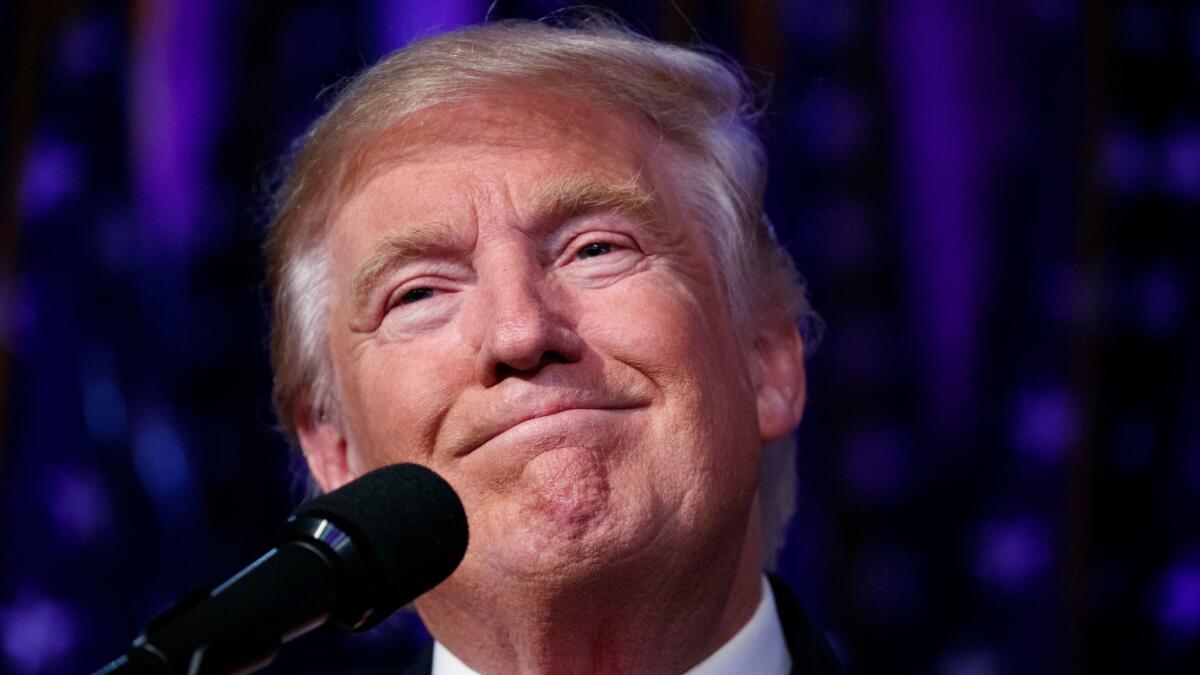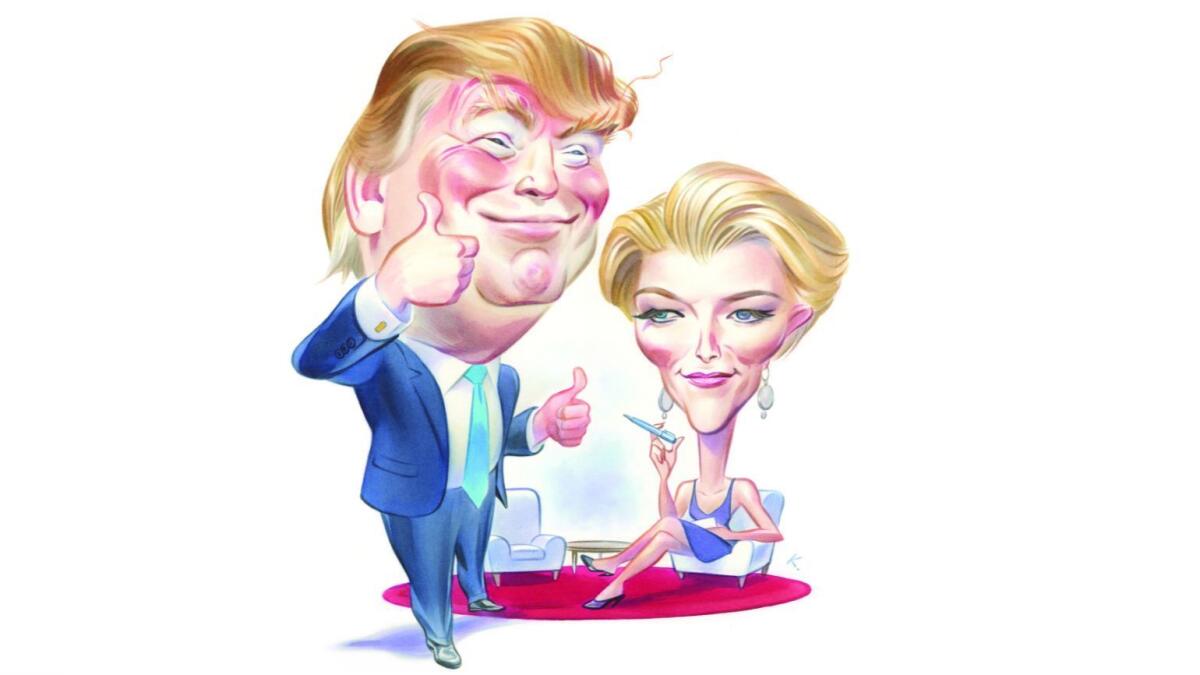How do you say âlowlifeâ in another language? Trumpâs tweets lose much in translation

His syntax is often broken, the meaning of his comments is sometimes unclear, and he is prone to rambling, repetition and exaggeration.
President Trumpâs language is an annoyance to some, a balm to others. But for one group, itâs something else â a professional hazard.
If native English speakers are having trouble processing Trump-speak, think of the challenges facing foreign translators and interpreters, who must grapple with the presidentâs verbal idiosyncrasies and make them understandable in another language.
âThere are several things that make an interpreterâs life easy,â said Christiane Abel, who teaches French translation and interpretation at the Middlebury Institute of International Studies at Monterey and is on the U.S. State Departmentâs roster of contract interpreters. âWhen people finish their sentences ⌠when the syntax is well-structured ⌠when the speaker starts speaking and you kind of understand where the person is going, you can kind of decode the underlying thought.â
Not so with Trump. The new leader of the free world is driving translators crazy.
âHe has the âApprenticeâ personality thing going on,â said Alessandro Duranti, former dean of the division of social sciences in the UCLA College of Letters and Science, whose expertise includes language as a cultural practice, and political discourse. âHe has a certain use of hyperbole. He actually insults people. He calls people âdummy,â âlowlife,â âfraud.â He talks in a way that is not the typical political speech. When thereâs a choice, he goes for whatever is the most colloquial.â
All of those attributes create minefields for those translating his words.
Chinese interpreters struggle with Trumpâs inclination toward hyperbole, according to Mandarin speakers. For example, âhuge,â âenormousâ and âtremendousâ all translate into the same word in Chinese: da, or âbig.â
âSometimes the translation is much more restrained than the original because the words he chooses are very ostentatious,â said Yin Hao, a graduate student at the South China University of Technology in Guangzhou, who has made a hobby of translating comments by U.S. politicians and posting them online.
Weibo, Chinaâs version of Twitter, increasingly fills with questions about the meaning of terms like âno nothing,â a reference to Trumpâs tweet: âI HAVE NOTHING TO DO WITH RUSSIA â NO DEALS, NO LOANS, NO NOTHING!â
Trumpâs sarcasm can also pose a challenge for Mandarin speakers, Yin said. A Taiwanese news agency misunderstood a tweet about the controversial phone call between Trump and Taiwanâs leader after Trumpâs election victory, Yin said.
âInteresting how the U.S. sells Taiwan billions of dollars of military equipment but I should not accept a congratulatory call,â Trump wrote.
The tone was one of sarcasm and indignation, but the news agency thought he was expressing regret, Yin said.
Duranti noted that simple words and phrases such as âniceâ â which Trump uses frequently as a sort of exclamation â can be difficult to translate into other languages, because âit covers a huge semantic field.â
And take the phrase âIt bombed,â which Trump used in a Washington Post interview to describe Arnold Schwarzeneggerâs low ratings when the former California governor debuted as host of âThe New Celebrity Apprentice,â an updated version of the TV show Trump used to host.
âIt cannot be properly translated,â Duranti said.
The literal translation of the word âbombedâ in Russian is bombili or razbomlenni, which means something has been destroyed by bombing.
David Quinto-Pozos, who directs the American Sign Language program at the University of Texas and is president of Mano a Mano, a national organization for Spanish-English-ASL interpreters, said Trumpâs use of terms such as âbad dudesâ (âWe have some protesters who are bad dudes, they have done bad thingsâ) can cause challenges for signers.
âASL doesnât have a sign for âdude,â and Spanish doesnât have a good word either,â Quinto-Pozos said.
âWhat is particularly challenging ⌠is sometimes you get these words that you would not expect from someone who was running for president, was president-elect and is now president.â
An example is Trumpâs comments that surfaced in the outtakes of the television show âAccess Hollywood,â in which he crudely spoke about making advances on a woman without her consent and about women allowing him to grab them by the genitals (and that, of course, is a translation from more vulgar English) because of his celebrity status.
âItâs a little jarring for interpreters and translators, not knowing how to find the equivalent in another language that matches the same register,â Quinto-Pozos said.
It has been especially challenging for translators in the Arab world, which remains very conservative about matters of sex and anatomy. While many U.S. news outlets, including The Times, quoted Trumpâs use of the vulgar term for vagina, the Lebanese newspaper Ad Diyar translated it as âspecial physical areaâ and the Saudi broadcaster Al Arabiya went with the chaste âsensitive areas on a womanâs body.â
And when Trump said of then-Fox News anchor Megyn Kelly, âthere was blood coming out of her eyes, blood coming out of her wherever,â the Qatari news outlet Al Araby translated it as: âBlood was coming out of her eyes and from all parts of her body.â

Beyond the problem of squeamishness, there is the question of register â determining the tone, decorum and feeling of what is being expressed. Simply put, some translators give Trumpâs words a dignity and clarity that they might not have in English, because they canât quite wrap their minds around a president who speaks the way he does.
âWhat we usually teach our students is that when you interpret in French, you use a higher register in the language,â said Abel, the Middlebury Institute professor, who said at some stage her students would be trained to practice on Trumpâs speeches.
âIf you interpret word for word in French, itâs going to sound really colloquial,â Abel said. For example, when rendering âgood job,â youâre going to try to make it a bit more polished in French, such as, âYour performance has been excellent.â
Japanese writer and translator Agness Kaku supplied more examples of this phenomenon in an essay on the LinkedIn website.
She recalled that after Gold Star mother Ghazala Khan stood beside her husband as he addressed the Democratic National Convention, Trump said: â[S]he probably, maybe she wasnât allowed to have anything to say, you tell me, but plenty of people have written that.â
Kaku said the Japanese broadcaster NHK interpreted that as: âShe likely wasnât allowed to give a statement.â
âI think there is the risk of cleaning it up,â Quinto-Pozos said. âEspecially for a foreign market that might not expect certain language from a person in this position, it does get cleaned up.â
Trump is far from the only political figure to receive such treatment. History is replete with examples of leaders whose language was sanitized by translators.
In her book âMan Without a Face: The Unlikely Rise of Vladimir Putin,â author Masha Gessen writes of an incident in which the Russian president said at a news conference in Paris that he was âinvitingâ Islamist terrorists to Moscow, where they would be âcircumcised ⌠in such a way that nothing will ever grow there again.â
The official interpreter, she said, âdid not dare translate Putinâs response in full.â
Some linguistic specialists said Trumpâs uncensored and off-the-cuff speaking style, though attractive to his support base, could expose him to ridicule.
âHeâs talking in a way that makes you feel that any person in the United States, regardless of their education, background, familiarity with the language of politics and bureaucracy, can listen to him and talk to him,â said Duranti of UCLA.
The problem, for those reading and listening around the globe, is that his American everyman language could get lost in translation.
Special correspondents Jessica Meyers in Beijing and Nabih Bulos in Beirut contributed to this report.
For more on global development news, see our Global Development Watch page, and follow me @AMSimmons1 on Twitter
ALSO
Trumpâs border wall: The view from El Paso
In Asia, China looks like the winner after scuttling of Trans-Pacific Partnership
More to Read
Sign up for Essential California
The most important California stories and recommendations in your inbox every morning.
You may occasionally receive promotional content from the Los Angeles Times.











